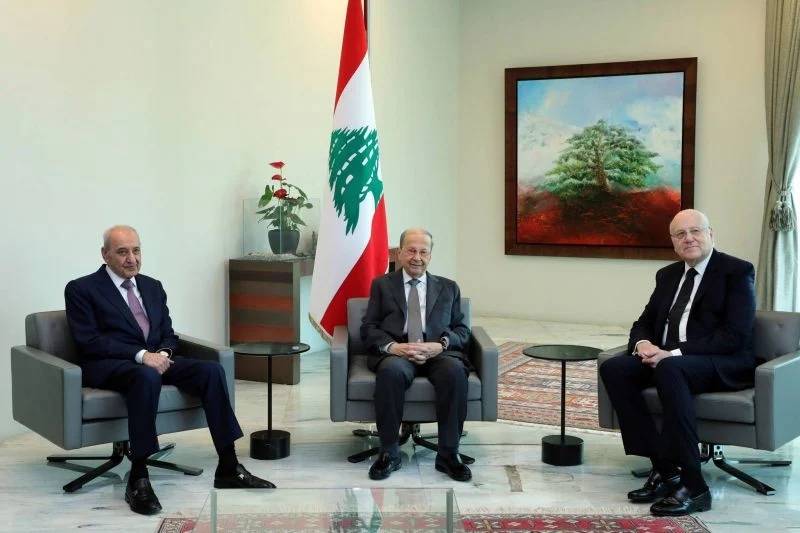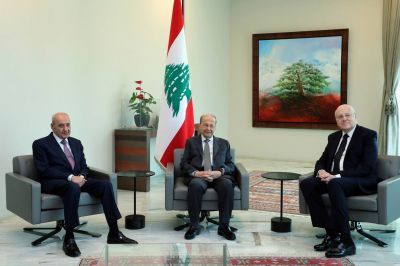
President Michel Aoun meets with Parliament Speaker Nabih Berri and Prime Minister Najib Mikati, on March 18 at the Baabda Palace. (Credit: Dalati and Nohra)
About 10 days. This is the time the Lebanese authorities have left to give their official response to the proposal of Amos Hochstein, the American mediator in the delimitation of the maritime border with Israel.
The special envoy came to Lebanon on Feb. 9 with an offer that he did not wish to reveal publicly. However, he had set the geographical limits of the negotiation in relation to the 860 square kilometers that separate Line 1 (border claimed by Israel) to Line 23 (officially claimed by Lebanon), leaving out Line 29, which gives Lebanon 1,430 square kilometers in addition to the disputed area.
L'Orient-Le Jour learned from various Lebanese parties involved just what the American proposal looks like: a winding border, which sometimes overlaps with Line 23, but which ultimately costs Lebanon about 20 percent of the area it claims.
That’s more than the Hof Line — named after US diplomat Frederic Hof, who mediated between the two sides between 2010 and 2012, awarding Lebanon 55 percent of the disputed area to Israel’s 45 percent — but far less than what Lebanon could claim by the standards of international law, according to experts.
To prepare the official response, President Michel Aoun invited Parliament Speaker Nabih Berri and Prime Minister Najib Mikati to Baabda on March 18. According to information obtained by L’Orient-Le Jour, the meeting between the three officials resulted in an agreement to make a counter-offer.
“The objective is to improve the conditions of the agreement so that Lebanon gets all the disputed 860 square kilometers,” said a source familiar with the matter. “We think it is possible to claim all of Line 23 and to ensure that the Qana field is entirely on our side of the border,” confirmed a source close to the president.
This decision comes in the wake of several statements by Hezbollah raising the stakes. The head of the pro-Iranian party’s parliamentary bloc, Mohammad Raad, said on Feb. 28 it was better “for the gas to remain buried in the sea until Lebanon is able to protect itself and prevent Israel from appropriating any drop of water.”
“We cannot accept Hochstein’s proposal, on the one hand because it is a winding line, and on the other because it would imply a form of normalization with Israel,” a senior party official who requested anonymity told L’Orient-Le Jour.
After Hochstein’s departure, Aoun wanted to form a technical committee with representatives of the presidency, the head of Parliament, the premiership, Army Command and the ministries concerned, such as the ministries of foreign affairs, defense, energy and public works.
Hezbollah and Amal, however, refused to participate in this committee. “In addition to depriving Lebanon of some of its rights, the American proposal is not clear on how the fields that could be located between the Lebanese and Israeli sides will be exploited,” said a close adviser to Berri, who requested anonymity.
According to press reports confirmed by L’Orient-Le Jour, the United States has considered international companies to explore the fields in the disputed areas — a prospect that the Lebanese authorities have refused outright.
‘Hezbollah will have the last word’
It was in this context that the meeting between the three Lebanese leaders took place. “The Americans insisted on the importance of all parties being on the same page to avoid future problems,” said a source close to the president.
L’Orient-Le Jour learned that Berri conditioned his participation on a guarantee that the final communiqué would emphasize the need to adhere to the framework agreement, concluded by the Parliament speaker in October 2020 before Aoun took over the dossier.
The statement indeed emphasizes the need to adhere to said communiqué and return to the Naqoura negotiations under the auspices of the United Nations and in the presence of the American mediator.
“Aoun wanted the negotiations to take place in Baabda, which we refused,” said the Amal leader’s advisor. The resumption of the Naqoura negotiations requires the reassignment of the military delegation, which implies the appointment of a new officer to replace retired Brig. Gen. Bassam Yassin.
Each Lebanese party is now making its little calculations. Berri clearly wants to have his say again.
“The framework agreement does not specify the demarcation lines,” said the Parliament speaker’s adviser, as if to emphasize that unlike Aoun, he has not abandoned Line 29 in favor of Line 23.
After pushing for Lebanon to claim the additional 1,430 square kilometers, the head of state has indeed backed down and now considers that Line 23 was the correct border.
Berri, for his part, remains ambiguous about his position in order to preserve some room for maneuver.
“If Line 23 is adopted, it means that it must be completely in favor of Lebanon and that it is unthinkable to accept that it is zigzagged,” Berri’s adviser said.
On the presidential side, there is more of a hurry to reach an agreement, but there are fears that “certain parties” are trying to derail it to prevent the president from claiming success. This is a clear jab at Berri, with whom relations are not good.
“Aoun has no consistency in this matter. He engaged in one-upmanship in relation to the Line 29, then accepted the Line 23 and now is ready to accept the Hof Line with a little modification,” Berri’s adviser said.
It has not yet been decided whether the Lebanese response will be given to Hochstein in person or through the US ambassador in Lebanon, Dorothy Shea.
In any case, an American diplomat told L’Orient-Le Jour, on condition of anonymity, that “Washington wants to reach an agreement as soon as possible,” and that it is not in “the interest of Lebanon to engage in one-upmanship.”
Hezbollah seems to be waiting for the regional and local political conditions to be met to conclude this agreement. “The party will have the last word on the matter and will make it known via the minister of labor,” said a senior Shiite party official.
This article was originally published in French in L'Orient-Le Jour. Translation by Sahar Ghoussoub.
